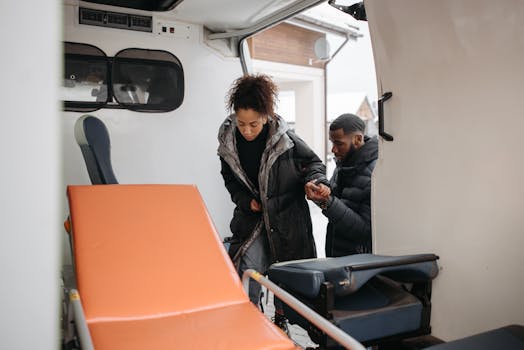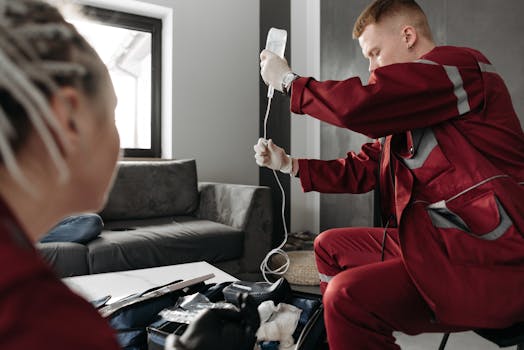You could take a college course, which may help you when looking for work.
Courses include:
- care
- health and social care
- T Level in Health
Entry requirements
Entry requirements for these courses vary.
Ambulance Care Assistants, sometimes called Patient Transport Service (PTS) drivers, are responsible for helping people who need non-emergency medical transport get to and from hospitals, clinics, and other healthcare facilities. Their main duties include helping patients in and out of vehicles, making sure they are safe and comfortable during journeys, and sometimes providing basic first aid if required. They often work with patients who have mobility issues, disabilities, or are elderly, so being caring and patient is essential. Most Ambulance Care Assistants work for the NHS, but there are also roles in private ambulance companies. The job requires a driving licence, good communication skills, and the ability to work as part of a team. Training is usually provided on the job, and there are opportunities for progression within the ambulance service.

The typical salary for an Ambulance Care Assistant in the UK ranges from £21,000 to £24,000 per year.
There are over 2,000 Ambulance Care Assistant positions in the NHS and private sector across the UK.
Ambulance Care Assistants usually work around 37.5 hours per week, often on a shift basis including evenings and weekends.

Responsible for safely transporting patients who do not need emergency care to and from hospital appointments, clinics, or other medical facilities.

Supports paramedics in responding to emergency calls, providing basic care and helping to move and transport patients in urgent situations.
Assists patients with mobility issues during non-emergency journeys, ensuring their comfort and safety while travelling to medical appointments.
Find out what Ambulance Care Assistants do on a day-to-day basis, including helping patients in and out of vehicles and assisting with their needs during journeys.
You can explore NHS websites or look for videos and articles that describe the role. This will help you decide if the job suits your interests and skills. Speaking to someone who works in the sector, such as at a careers fair or through work experience, can also provide valuable insights.
Review the qualifications and skills needed to become an Ambulance Care Assistant, including any necessary driving licences or health checks.
Most employers look for good literacy and numeracy skills, and some require GCSEs (or equivalent) in English and maths. A full UK driving licence is often needed, and some roles require a C1 category on your licence. You may also need to pass a Disclosure and Barring Service (DBS) check, as you will be working with vulnerable people.
Build experience in roles that involve helping or working with people, such as in healthcare, retail, or volunteering.
Experience in a caring environment, such as care homes, hospitals, or volunteering with charities, can make your application stand out. Communication, patience, and empathy are key skills for this role. You can also take first aid courses to enhance your knowledge.
Ensure you meet the health and fitness requirements and obtain the correct driving licence if needed.
You may need to undergo a medical examination to confirm you are fit for the role. If you do not have a C1 category on your driving licence, you may need to take additional tests. Some employers may provide training for this as part of your induction.
Look for Ambulance Care Assistant vacancies within the NHS, private healthcare providers, or patient transport services.
The NHS Jobs website is a good place to start, as is Health Jobs UK. Tailor your CV and application to highlight your caring experience, driving skills, and understanding of the role. Prepare for interviews by practising common questions and demonstrating your commitment to patient care.
Once employed, take part in on-the-job training provided by your employer to learn safe patient handling and basic first aid.
Training usually covers manual handling, safeguarding, infection control, and emergency procedures. You may also shadow experienced staff before working independently. Continuous professional development is encouraged in this role.
Explore relevant apprenticeships that can help you kickstart your career in Ambulance Care Assistant. Apprenticeships offer hands-on experience and training while earning a wage.
An Ambulance Care Assistant and a Care worker both provide care and support to individuals, often in health or social care settings. They assist with daily activities, offer emotional support, and help improve the well-being of their clients, making their roles closely aligned.
You can get into this job through:
You could take a college course, which may help you when looking for work.
Courses include:
Entry requirements for these courses vary.
You could apply to do an apprenticeship with a care organisation or the NHS.
Apprenticeship options include:
These can take between 1 and 2 years to complete and combine workplace training with study in the classroom.
There are no set entry requirements but it may help you to get in if you have:
You can volunteer with an organisation that supports vulnerable people, like a care home, charity, hospital or hospice. This can help you when applying for paid work.
You can find volunteering opportunities through:
You can apply for care worker jobs directly. If you get the role, you'll be given on-the-job training by your employer.
It's important to be kind, caring and have a respectful attitude towards people who need care and support.
Some employers might want you to have GCSEs in English and maths at grades 9 to 4 (A* to C), or equivalent. However, many will offer training to applicants who have the right personal qualities.
Time spent caring for someone you know also counts as having experience in a caring role.
You can find out more about careers in care from:
Explore other careers or use our AI to discover personalised paths based on your interests.
Address
Developing Experts Limited
Exchange Street Buildings
35-37 Exchange Street
Norwich
NR2 1DP
UK
Phone
01603 273515
Email
[email protected]
Copyright 2026 Developing Experts, All rights reserved.
Unlock expert-designed lessons, resources, and assessments tailored for educators. No credit card required.
Claim Your Free Trial →